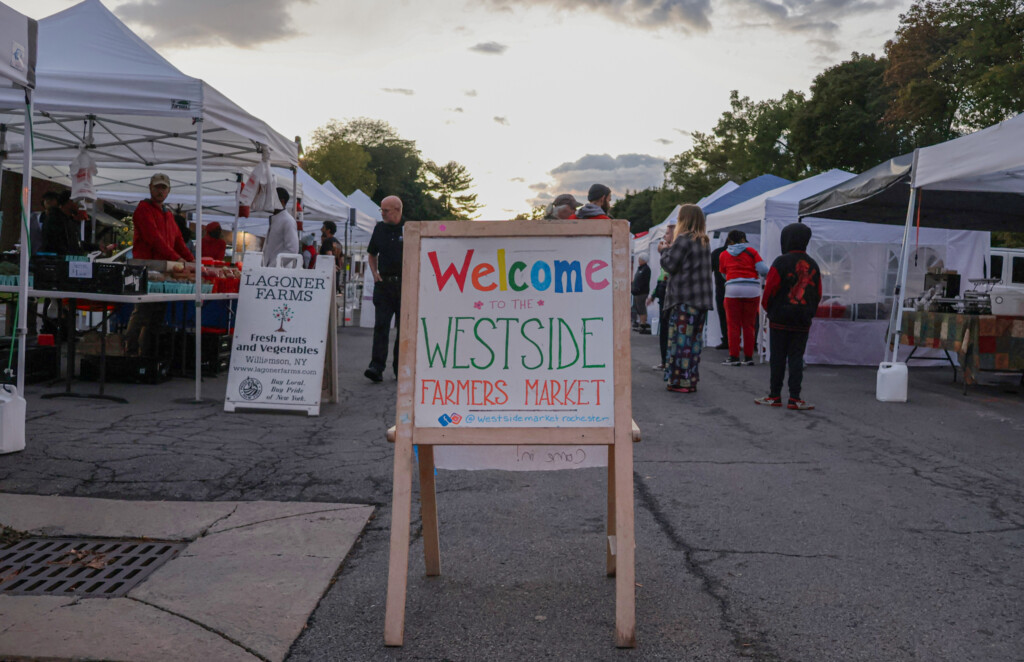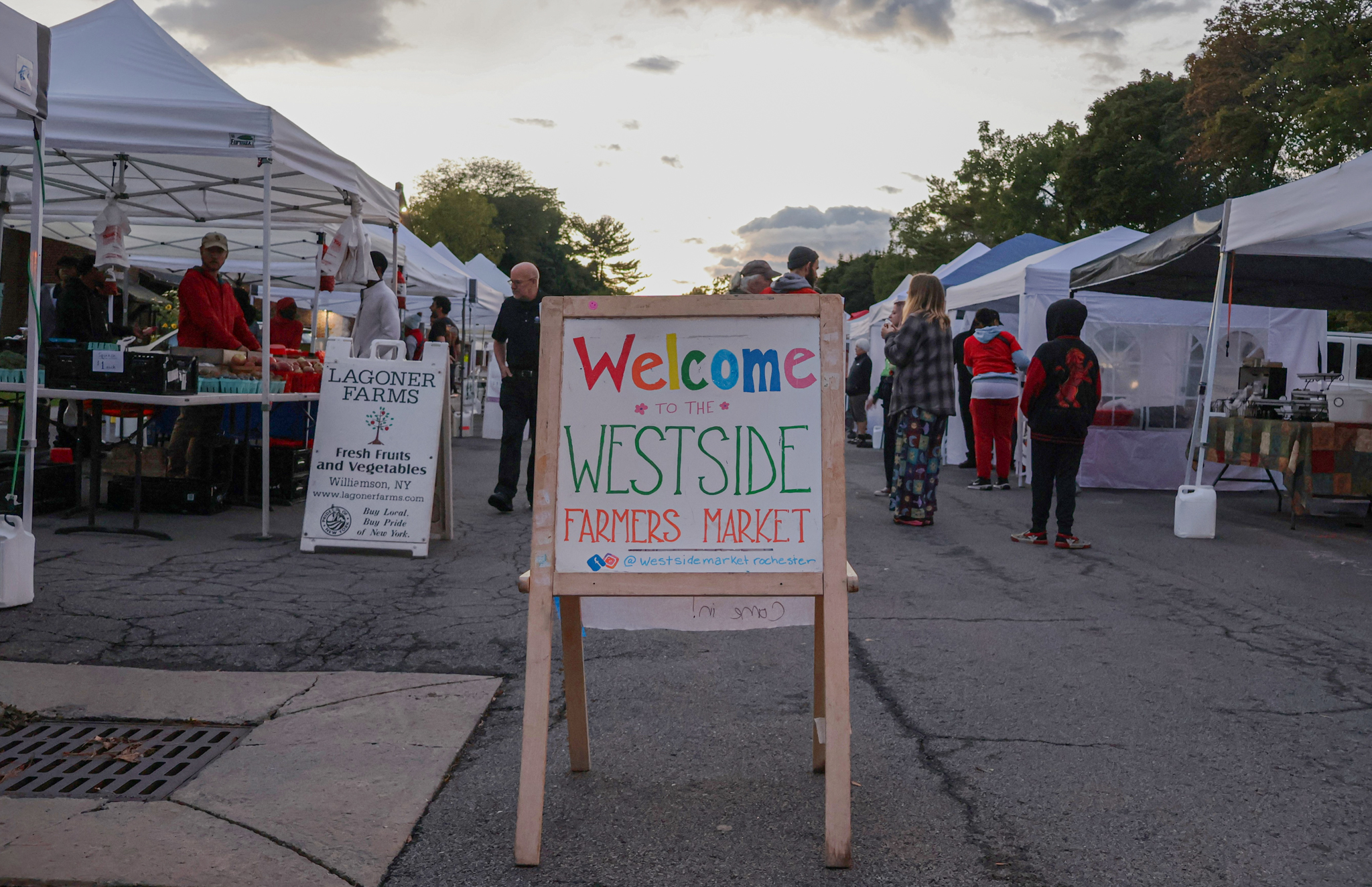
Urban Fellows is an annual program open to college students in the Rochester area: This includes UR students, students at local universities, or any student originally from the Rochester area. Pictures is the Westside Farmers Market where one Urban Fellow is historically partnered with each year.
Urban Fellows, an annual program hosted by the Center for Community Engagement (CCE) and funded by Americorp, gives undergraduate students the opportunity to work with local nonprofits over the summer — and get paid for it.
Each student is matched with a nonprofit, which they remain with for the 10 weeks of the program.
“We pair all of those undergraduates with a local organization in the community that’s working on an anti-poverty project. That can be a bunch of different things,” program manager, Sarah Murphy ‘19 said.
Common projects tackle summer learning loss and food insecurity for youth but can center around anything from community gardens to employment readiness.
Junior Mowaz Alvi participated in the program this past summer and worked with the Westside Farmers Market. His role included social media marketing and door-to-door outreach to increase awareness about the market and how it supports the community in meaningful ways.
“I would essentially do my best to talk to the local community to understand their needs and help them direct them to proper resources, which were available at the market,” Alvi said. “[Another] specific role was to get people that were under [Supplemental Nutrition Assistance Program] (SNAP) benefits to get people to come to the market because they would benefit the most,” he said.
Though he didn’t know much about the market or its importance before this summer, Alvi, a Health, Behavior, and Society major, quickly realized its importance after learning Rochester is considered a food desert. The weekly market, located at St. Monica Church on Genesee St, helps to fight against this.
“We feel as though [the market is] a social justice endeavor and people deserve choices,” the manager of the market Jessica DiSalvo said. “It’s not so much that we think everyone should be eating farm fresh food; the point is you shouldn’t only be able to get a can of soup at Family Dollar if you’re hungry. You should have a choice. And because we live in a food desert …it’s very much the foundation of everything that people deserve a choice.”
Since the market’s founding, Urban Fellows have been working with the organization each year. “As long as there’s been a market, Urban Fellows has been involved. The most impressive thing to me is the retention rate of the Urban Fellows. We have people who continuously volunteer and are on the board, and it’s pretty special,” DiSalvo said.

At the Westside Farmers Market, customers with SNAP benefits are encouraged to browse and shop because of a special program where they receive double the benefits when they are used at the market.
Senior Leena Rouyer was also an Urban Fellow this summer. After a friend participated in the program last year, she decided to apply and was paired with SewGreen, a nonprofit that Rouyer describes as “essentially a thrift store for fiber art supplies.”
Over the summer, in addition to working with customers and their projects, Rouyer’s focus was on community engagement. She created a survey to understand the demographics of SewGreen’s clients.
“I got over 300 responses, and with all this data, I wrote up a report for the board of SewGreen with suggestions to improve the customer experience and reach out to the populations in the Rochester community who aren’t represented in the customer base,” she said.
After graduation, Rouyer hopes to become a high school biology teacher. Although this is in a different field than her work over the summer, her experience still guided her to what she wants her future to be
“This summer really cemented the idea I had to work in the Rochester school district, and I had the opportunity to learn so much about the area,” she said. “Even if it is not exactly in line with the career path I had in mind.”
Urban Fellows are matched to their partner organization by CCE. To make the matches, CCE considers the selected Fellows’ interests, particular skills, and past experiences as well as the organizations’ needs (some projects are better fit for older students or have transportation requirements).
“It’s a big puzzle to figure out who’s gonna go where, but it works out very beautifully every year,” Murphy said. “We always have everyone remark, ‘Wow, everyone’s at the perfect host site for them,’ and we’re like, ‘Yes!’”
“We had an Urban Fellow in 2023 who also worked part-time as a home health care aid, and we had an organization that was looking to expand its services into the home healthcare space. So we were like, ‘Oh my gosh, what a perfect match: This person has lived experience in this area and could really be an asset to her host site — which she was, and she’s actually still working with them part-time,” Murphy said.
In addition to the on-site work the Urban Fellows do with their host organizations, the fellows come together with CCE staff once a week for additional training and team bonding. The Fellows learn and immerse themselves in a different topic each week at the “Urban Issues” seminars.
“It’s the best part of the Urban Fellows program by far,” Murphy said. “In the morning, we bring in either a faculty member or community leader to talk about the topic of the week, [which] can be anything from residential segregation, health disparities, [or] economic opportunity and empowerment.”
These Wednesday sessions were also a great way for Urban Fellows to get to know each other.
“We got very close as a group while just meeting once a week,” Rouyer said. “The program would not have been nearly as special without them.”

Urban Fellows are considered Americor associates over the summer and receive a stipend of around $4,000 in addition to free on-campus housing. They also receive a Segal AmeriCorps Education Award at the end of the program of about $1,500 that can be used towards educational expenses. Pictured is the Westside Farmers Market.
The program brought many of the Fellows into the larger Rochester community for the first time. Murphy, who as a student participated in both CCE programs she currently works with — Urban Fellows and Rochester Youth Year — began to think of Rochester as her community only after her summer with Urban Fellows.
According to Murphy, because many students don’t often leave campus to go into the city, they don’t get to experience this.
“I think that’s so sad because there’s so much that Rochester has to offer and so much cool stuff happening in the city. And also, when students don’t leave campus, the City of Rochester misses out on getting to know all of you and building a healthier relationship with the University.”
This summer, though, Rouyer learned more about the city and grew a new appreciation for the community.
“I already loved this city before I did the program, but now I am much more active in the community,” Rouyer said. “It’s easy to live in a bubble — especially as a college student — and not realize the work people put into the community, but I had such a great time learning about what so many people do to improve Rochester.”
Alvi believes that these community members and programs are the backbone of Rochester’s strength and success.
“I think the beauty about Urban Fellows is that you get closer to the Rochester community, and you realize that at the end of the day, we’re all trying to help each other out, and those community partnerships are so important to everyone’s social, economic, and personal development,” Alvi said. “Without organizations like SewGreen and Westside Farmers Market and the People’s Pantry, Rochester wouldn’t function and would not have come back after the fall of Kodak.”

Vendors at the Westside Market are all from Rochester and sell fruit, vegetables, cheese, meat, sweets, soap and other goods. It is a 15-minute walk from campus.
As they understand local issues, use new skills, and meet people over the course of the program, Fellows learn more about their own interests as well.
“This summer was truly transformative to me,” Rouyer said. “Before this, I had restricted myself to only lab [or]STEM work, but this kind of community work is what is really fulfilling to me.”
Murphy felt a similar shift after participating in the program as an undergrad.Seeing this shift in current students is now one of the most special parts of her job.
“Now working with the program as a staff member, I’ve worked with three Urban Fellows cohorts over the years,” Murphy said. “It’s always so powerful to witness that process of discovery that students have, not just about Rochester but about themselves too.”
Applications for the 2025 Urban Fellows Cohort will be released in late November or early December. For more information, check CCE’s Instagram @UR_CCE.


